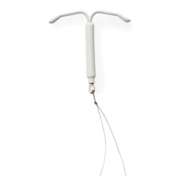Do we have yet another reason to love the IUD?
New research suggests it might lower risk of cervical cancer.

Long-acting reversible contraceptives (LARCs) are those birth control methods—like the IUD—that work really well at preventing pregnancy without you having to to do anything special on a daily (or even yearly) basis. We love them because they’re easy to use, very effective, and when you factor the overall cost over time, they’re super affordable. Those reasons alone make IUDs popular, but there may be another surprising health benefit associated with them. Researchers have recently uncovered a potential link between IUDs and decreased risks of cervical cancer.
Drawing on 16 studies of over 12,000 women around the world that examine the relationship between IUD and incident of cervical cancer, the researchers conducted a meta-analysis (which is “research-speak” for examining studies to find common themes) to identify the association between IUD use and rates of cervical cancer. They found that the rate of cervical cancer was about 30% lower in women who reported having an IUD (both hormonal and non-hormonal).
While these findings are promising, the authors note that many of the studies included in the analysis were published before the HPV vaccine was available. Additionally, most of the studies included in the meta-analysis were based on the non-hormonal IUD (Paragard) because hormonal IUDs (Mirena, Skyla, Kyleena) were not as widely available when the initial studies took place.
Many of the studies included in the analysis are observational in nature which means we don’t necessarily know that the IUD is causing the decreased risks of cervical cancer. Researchers suspect that IUDs may help the body clear persistent HPV infections, and HPV infections are a leading cause of cervical cancer.
Ultimately, these findings are good news. Why? Because they suggest that IUDs not only provide an effective way to prevent unplanned pregnancy, but they may also provide protection against one of the leading cancers among women globally. While you may not necessarily want to run out a get an IUD of your own, many birth control methods have benefits beyond preventing babies. Whatever you decide, we want you to take charge of your sexual health on your own terms.
How do you feel about this article?

Heat up your weekends with our best sex tips and so much more.
